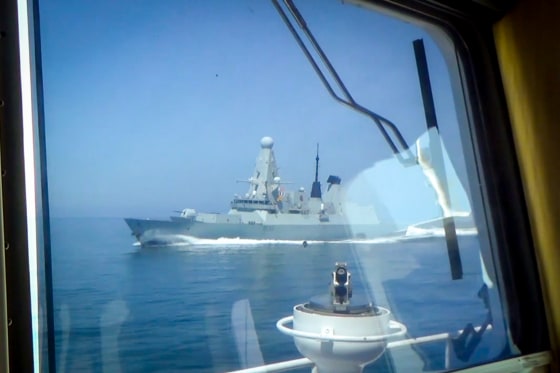MOSCOW — Russia is prepared to target intruding warships if they fail to heed warnings, a senior diplomat declared Thursday after a Black Sea incident in which a British destroyer sailed near Crimea in an area that Russia claims as its territorial waters.
Russia said one of its warships fired warning shots and a warplane dropped bombs in the path of British destroyer Defender on Wednesday to drive it away from waters near the Crimean city of Sevastopol. Britain denied that account, insisted its ship wasn’t fired upon and said it was sailing in Ukrainian waters.
The incident marked the first time since the Cold War that Moscow acknowledged using live ammunition to deter a NATO warship, underlining the rising threat of military collisions amid Russia-West tensions.
Russian Deputy Foreign Minister Sergei Ryabkov said Thursday that “the inviolability of the Russian borders is an absolute imperative,” adding that it will be protected “by all means, diplomatic, political and military, if needed.”
Download the NBC News app for breaking news and politics
He sarcastically suggested the British navy should rename its destroyer from Defender to Aggressor and warned that “those who try to test our strength are taking high risks.”
Asked what Russia would do to prevent such intrusions in the future, Ryabkov told reporters it would stand ready to fire on targets if warnings don't work.
“We may appeal to reason and demand to respect international law,” Ryabkov said in remarks carried by Russian news agencies. “If it doesn’t help, we may drop bombs and not just in the path but right on target, if colleagues don’t get it otherwise."
Kremlin spokesman Dmitry Peskov deplored what he described as a "deliberate and well-prepared provocation” by Britain and seconded the tough warning.
“If unacceptable provocative actions are repeated, if those actions go too far, no options to legitimately protect the borders of the Russian Federation could be excluded,” Peskov told reporters.
On Wednesday, the Russian Defense Ministry said a patrol ship fired warning shots after the HMS Defender had ignored a notice against intrusion and sailed 3 kilometers (1.6 nautical miles) into Russia’s territorial waters near Sevastopol, the main Russian naval base in Crimea.
It said a Russian Su-24 bomber also dropped four bombs ahead of the vessel to persuade the Defender to change course. Minutes later, the Defender left Russian waters, the ministry said.
Britain denied the Defender had been fired on or that bombs were dropped in its path. It insisted the ship was making a routine journey through an internationally recognized travel lane and remained in Ukrainian waters. The U.K., like most of the world, recognizes Crimea as part of Ukraine despite the peninsula's 2014 annexation by Russia.

British Prime Minister Boris Johnson would not say whether he had personally approved the Defender’s voyage but suggested the Royal Navy was making a point by taking that route.
“The important point is that we don’t recognize the Russian annexation of Crimea, this is part of a sovereign Ukrainian territory,” Johnson told reporters Thursday during a visit to an army barracks in England. “It was entirely right that we should vindicate the law and pursue freedom of navigation in the way that we did, take the shortest route between two points, and that’s what we did.”
He denied that U.K.-Russia relations were at a historic low, noting that “I can remember times in my own lifetime when things have been far worse."
In April, Russia declared a broader area off Crimea closed to foreign naval ships until November, a move that drew strong protests from Ukraine and the West.

